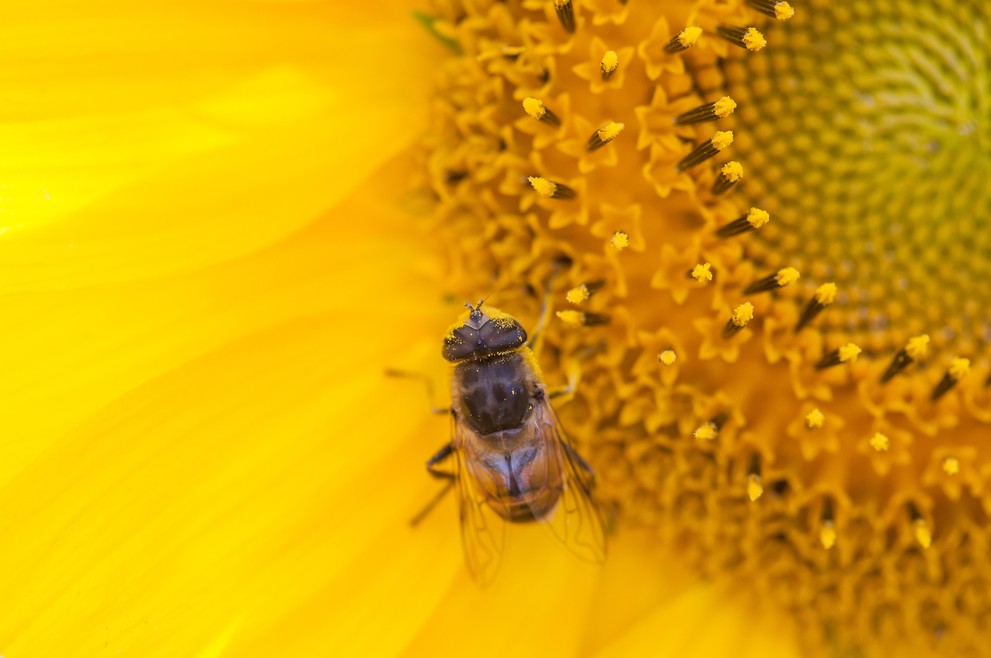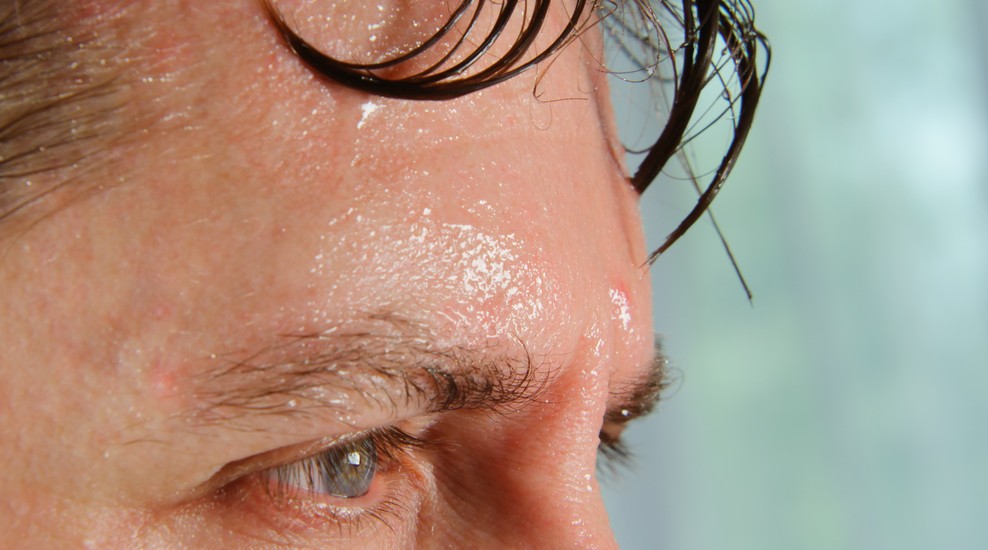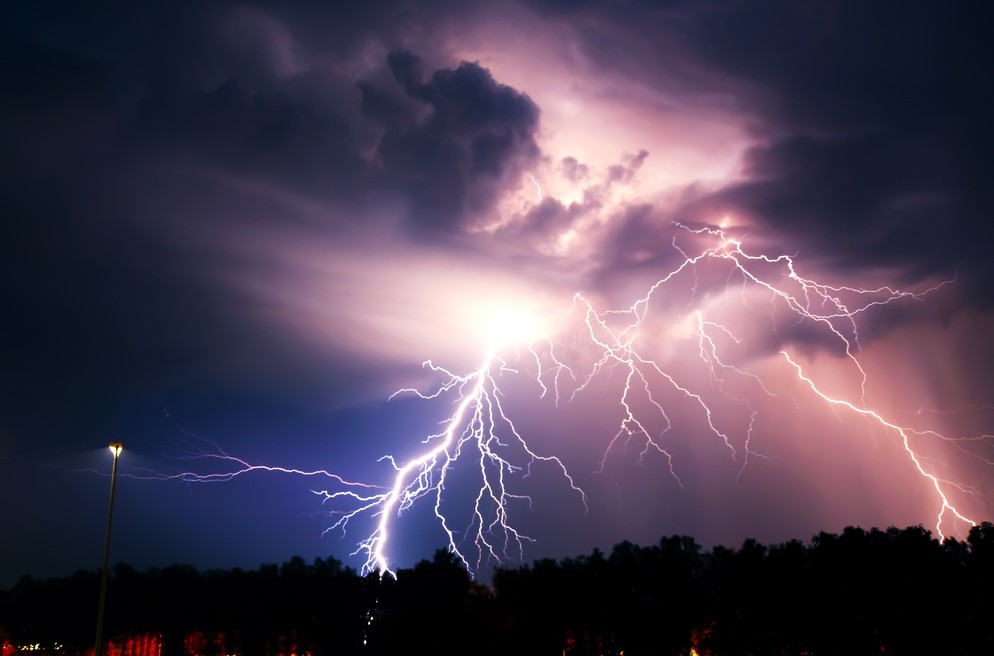Does the Creator of the World Care About Someone as Small as Me? 5 Points to Consider
Have you ever wondered how plants multiply, how lightning and thunder are formed, what makes facial sweat special, and how our body protects itself from burns?
 (Photo: shutterstock)
(Photo: shutterstock)Pollination
How can a small, furry insect be responsible for most of the food we consume, such as apples, mangoes, watermelons, onions, and more? The answer is summed up in one word: pollination.
For plants to reproduce and create more plants, they need pollination, meaning that pollen from a male flower reaches a female flower of the same plant species and fertilizes it. The flower then turns into a fruit containing seeds, and a new growth cycle begins.
Pollination is a basic condition for fertilization and fruit creation. In this process, pollen grains are transferred from the stamens—the male part of the flower—to the stigma—the female part of the flower. These plants have flowers with prominent colors or scents that attract insects. In "exchange" for pollination, plants offer insects nectar (a food source).
Pollination serves as a foundation for reproduction in seed-bearing plants and plays an essential role as a means of spreading the genes of that organism since plants cannot move on their own and reproduce. So how do they move and spread?
 (Photo: shutterstock)
(Photo: shutterstock)
Many plants are pollinated by various insects: bees, beetles, butterflies, and flies. Bees are considered the most sophisticated pollinators in the insect world: their lifestyle is particularly adapted to symbiotic living with flowering plants.
With each new flight from the hive, the honeybee visits flowers of a single plant species. This is advantageous for the pollinated plants because all the pollen they produce is transferred only between flowers of the same species, without wasting it on other flowers. Many flowers indicate their status to bees by changing color (such as the mountain lupine), allowing bees to avoid visiting flowers that have already been fertilized.
How does pollination occur? When a bee lands on a flower, pollen grains stick to its body, and when it lands on another flower of the same species, the pollen grains fall off and fertilize the flower. This is a sophisticated mechanism of plants to disperse pollen over long distances.
It's important to remember: the animals that pollinate do not come to the plants with the intention of pollinating the flowers. In most cases, they come to the flowers to find food there—nutritious nectar and pollen. During their food collection, the pollen grains stick to their bodies and are thus transferred from flower to flower...
How is it possible that a small, furry insect like the bee is responsible for most of the food we consume? How do two mechanisms, the animal and plant worlds, operate in full harmony and completion at such a sophisticated level? Isn't this clear evidence that one Designer and Creator planned and created them all?
Sweat
Unappealing as it may be, the process of sweating is normal and essential. Without it, our body would not be able to cool down. Sweat's role is to be a natural thermal regulator designed to cool the body when it overheats.
I happened to talk with a dermatologist, and in the course of my bothersome questions, he casually shared a very interesting detail about sweat. He said that body sweat is harmful and dangerous, and one should be cautious of its contact with the eyes, whereas facial sweat is not harmful.
Wait, isn't it wondrous that the sweat secreted from a human's body is toxic, yet there's one body area where sweat isn't toxic, which is precisely the face area? After all, sweat might easily enter our eyes or mouth and harm them?!
 (Photo: shutterstock)
(Photo: shutterstock)The wonder intensifies considering that this detail has been known for thousands of years in our holy Torah. Sages distinguished between facial sweat, which is not harmful, and body sweat, whose consumption is considered dangerous: "One must be cautious of human sweat, as all human sweat is a deadly toxin, except for facial sweat" (Shulchan Aruch, Yoreh De'ah, section 116, clause 4, cited in the Jerusalem Talmud, Terumot 8:3, 43a).
There is no explanation in the sources for the reason behind the difference between the two types of sweat, even though there's no difference in the composition of the secreted sweat (according to the research of Rabbi Dr. Avraham Ophir Shemesh—"Human Tissues as a Source for Ancient Healing Materials").
There is no doubt that this remarkable phenomenon indicates a guiding and caring hand...
How did the sages know this? After all, they didn't have the advanced scientific tools that we have today! Isn't this proof that the Torah of Israel, in which these scientific insights are written, was not written by a human factor, but rather by He who created creation gave the Torah?...
Lightning and Thunder
"Did you hear that boom? Did you see that flash? It's frightening!" my wife said to me on that especially rainy day.
Those were the lightning and thunder... Why do lightning and thunder occur?
Lightning is a climatic phenomenon in which static electricity accumulated in the clouds discharges to the ground or another cloud. As a result of the electricity discharge through the air, the air heats up significantly, reaching about 30,000 degrees. This is the reason for the fast flash of light, the lightning.
 (Photo: shutterstock)
(Photo: shutterstock)Thunder is created following the rapid heating of the air, leading to its expansion, and then immediately to rapid contraction due to its cooling; the thunder, the "boom" we hear, is the shock wave from this explosion.
Have you noticed a natural law in creation, that always, but always, lightning comes before thunder? Why always in this order? Because the speed of light (about 300,000 km per second) is vastly greater than the speed of sound (about 340 meters per second), thunder is heard after the lightning.
A Protective Body
Each of us has experienced the following phenomenon: we reached out to touch something hot, and then suddenly our hand was lifted in a way that is uncontrollable by us.
What is the explanation for this?
Information transfer and reception from various body parts are done through the nervous system. The nerves conduct sensations and instructions from the body to the brain, and vice versa—from the brain to the body. They convey this through the transmission of electrical signals in the body, signaling senses of light, sound, pain, pressure, heat, or cold, among others.
When touching something too hot, temperature sensors in the skin send electrical signals to the brain. The brain identifies the signal, interprets it as pain, and sends another signal back to the muscles. As a result, the hand moves away from the hot object, and all this occurs at lightning speed of about 300 km/h!
The nervous and muscle systems in our body are well-planned and coordinated to protect us from harm, and in this case—from burns.
Imagine a person engaged in conversation, inadvertently placing their hand on something superheated... Without the extensive nervous system, they wouldn't feel it until, heaven forbid, they lose the skin on their hand... But that's not enough, because there's no benefit in the nervous system alerting the brain that the hand is in danger unless the muscle system quickly receives a command from the brain to contract in a chain reaction, thus lifting the hand and distancing it from the threat.
Someone "scattered" nerve sensory receptors all over our skin and "planted" even more sensory receptors in the more sensitive areas: the hands, face, and mouth. Have you wondered how our reaction to fear, touch, or danger is so quick? The electrical signals at the nerve bases move at an enormous speed, reaching about 300 km/h or more.
It is clear to everyone that such perfect coordination between two different systems in the human body, the nerves, and muscles, and our incomprehensibly fast reaction to fear, touch, or danger at the nerve bases—all these are intended to save our lives from dangers and bad occurrences! Who protects us from harm?
Does the Great Creator of the World Care About Me, the Small Person?
There are people who sincerely say, "I don't keep commandments because who am I compared to Hashem? Does the Creator of the World really care about me, the small and simple person? Does it really matter to Him if I said this word or that word? If I did this action or that action? Will I pray for success in a test? For that? Do you think Hashem has time for such trivial things? In a world rampant with hunger, terror, diseases, abuse... what's going through your mind?"
Friends, the answer is simple: Of course, it does!
Just like nothing is "too big" for Hashem, nothing is "too small" either. Anyone who thinks that Hashem is too busy with truly important matters to pay attention to the trivial things in life is ascribing human limitations to the one who is omnipotent.
Of course, the Creator of the world cares! If He writes in the Torah to do this or that, it means it's important to Him. If He wrote that you must lay tefillin—"And you shall bind them as a sign on your hand, and they shall be as frontlets between your eyes" (Deuteronomy 6:8)—it means it is an act important to Him for you to do—for your benefit! The Creator of the World gives you immense powers to activate all the higher systems of creation—through the commandments!
The Torah does not provide an exemption from observing commandments without a justified reason. The Torah does not exempt from observing commandments those who think the Creator of the world is not interested in their actions, nor does it grant exemption from observing commandments to those who are lazy to get up in the morning for Shacharit prayer. Nor does it to "people of opinion," just because they have reservations or criticism about the Torah...
Let's not be confused! A person indeed has a choice to follow the commandments, but that doesn't mean they're not obligated to observe them. There is a choice, which includes reward and punishment for one's choices.
This reminds me of a funny phrase a secular friend told me: "You can't lie. You're religious"...
Friends, in the end, whether a person keeps or does not keep the commandments, the Creator of the world will judge them fairly, and there is no injustice in judgment. Each person will receive their reward or, alternately, their punishment, according to their actions...

